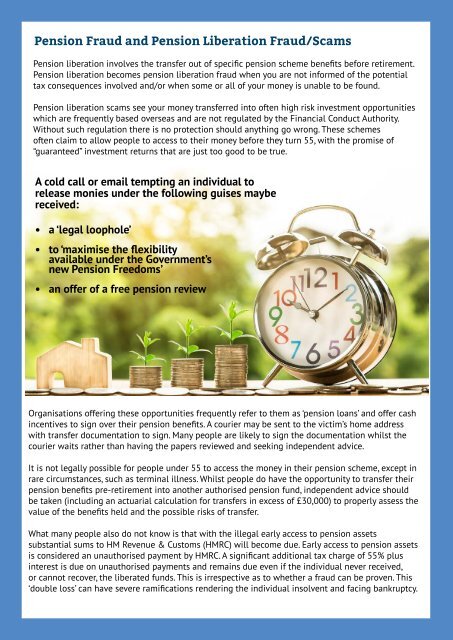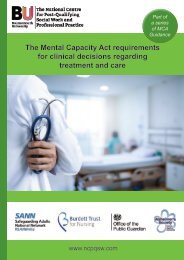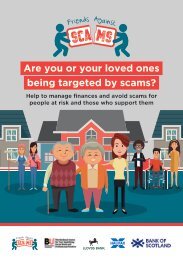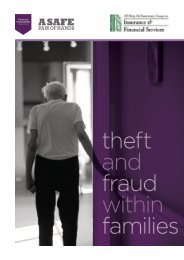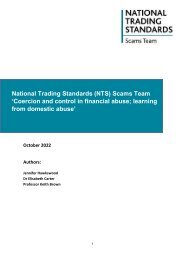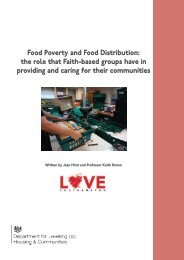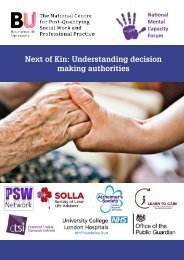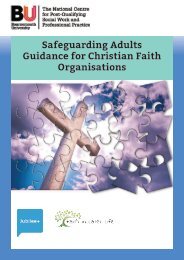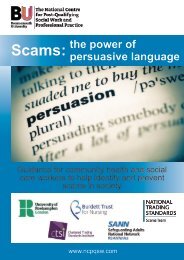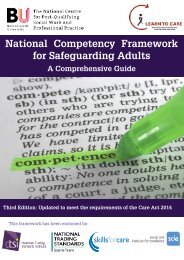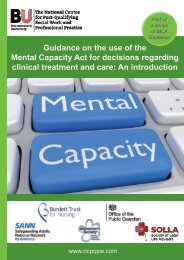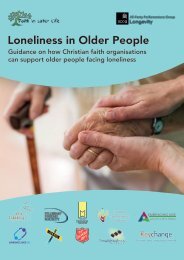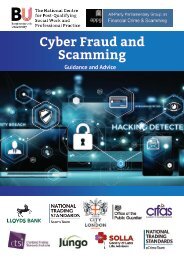Financial Scamming and Fraud
Financial scamming and its impact have been receiving a higher public profile in recent months, yet though it is recognised as a growing problem, there is a lack of clear research and evidence into the scale of the problem, its causes and the impact on the public.
Financial scamming and its impact have been receiving a higher
public profile in recent months, yet though it is recognised as a
growing problem, there is a lack of clear research and evidence
into the scale of the problem, its causes and the impact on the
public.
Create successful ePaper yourself
Turn your PDF publications into a flip-book with our unique Google optimized e-Paper software.
Pension <strong>Fraud</strong> <strong>and</strong> Pension Liberation <strong>Fraud</strong>/Scams<br />
Pension liberation involves the transfer out of specific pension scheme benefits before retirement.<br />
Pension liberation becomes pension liberation fraud when you are not informed of the potential<br />
tax consequences involved <strong>and</strong>/or when some or all of your money is unable to be found.<br />
Pension liberation scams see your money transferred into often high risk investment opportunities<br />
which are frequently based overseas <strong>and</strong> are not regulated by the <strong>Financial</strong> Conduct Authority.<br />
Without such regulation there is no protection should anything go wrong. These schemes<br />
often claim to allow people to access to their money before they turn 55, with the promise of<br />
“guaranteed” investment returns that are just too good to be true.<br />
A cold call or email tempting an individual to<br />
release monies under the following guises maybe<br />
received:<br />
• a ‘legal loophole’<br />
• to ‘maximise the flexibility<br />
available under the Government’s<br />
new Pension Freedoms’<br />
• an offer of a free pension review<br />
Organisations offering these opportunities frequently refer to them as ‘pension loans’ <strong>and</strong> offer cash<br />
incentives to sign over their pension benefits. A courier may be sent to the victim’s home address<br />
with transfer documentation to sign. Many people are likely to sign the documentation whilst the<br />
courier waits rather than having the papers reviewed <strong>and</strong> seeking independent advice.<br />
It is not legally possible for people under 55 to access the money in their pension scheme, except in<br />
rare circumstances, such as terminal illness. Whilst people do have the opportunity to transfer their<br />
pension benefits pre-retirement into another authorised pension fund, independent advice should<br />
be taken (including an actuarial calculation for transfers in excess of £30,000) to properly assess the<br />
value of the benefits held <strong>and</strong> the possible risks of transfer.<br />
What many people also do not know is that with the illegal early access to pension assets<br />
substantial sums to HM Revenue & Customs (HMRC) will become due. Early access to pension assets<br />
is considered an unauthorised payment by HMRC. A significant additional tax charge of 55% plus<br />
interest is due on unauthorised payments <strong>and</strong> remains due even if the individual never received,<br />
or cannot recover, the liberated funds. This is irrespective as to whether a fraud can be proven. This<br />
‘double loss’ can have severe ramifications rendering the individual insolvent <strong>and</strong> facing bankruptcy.


